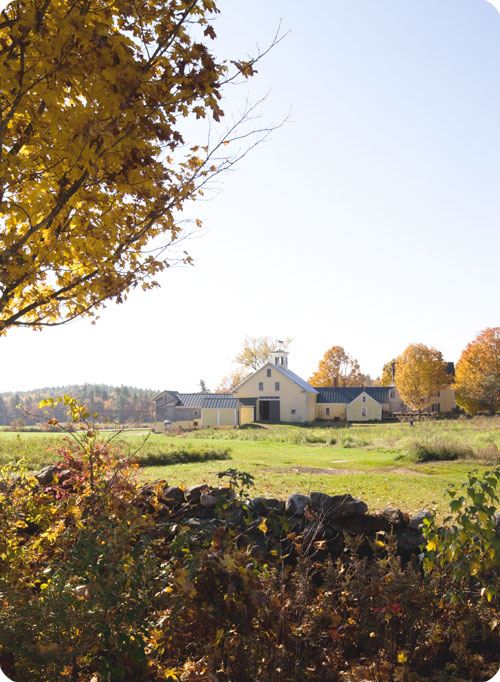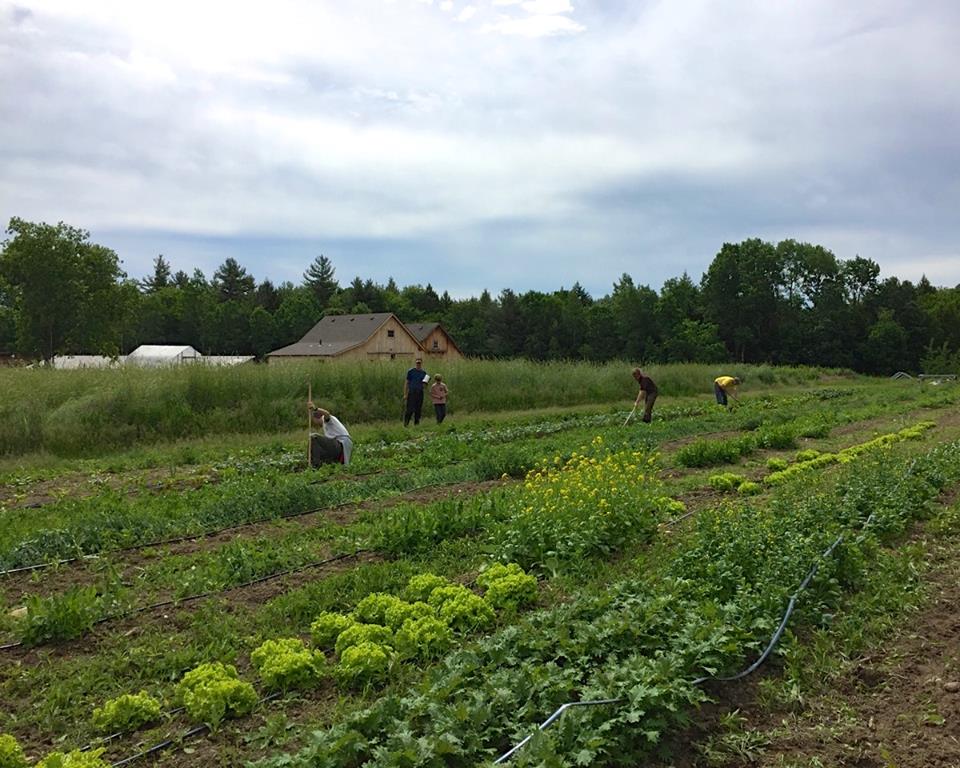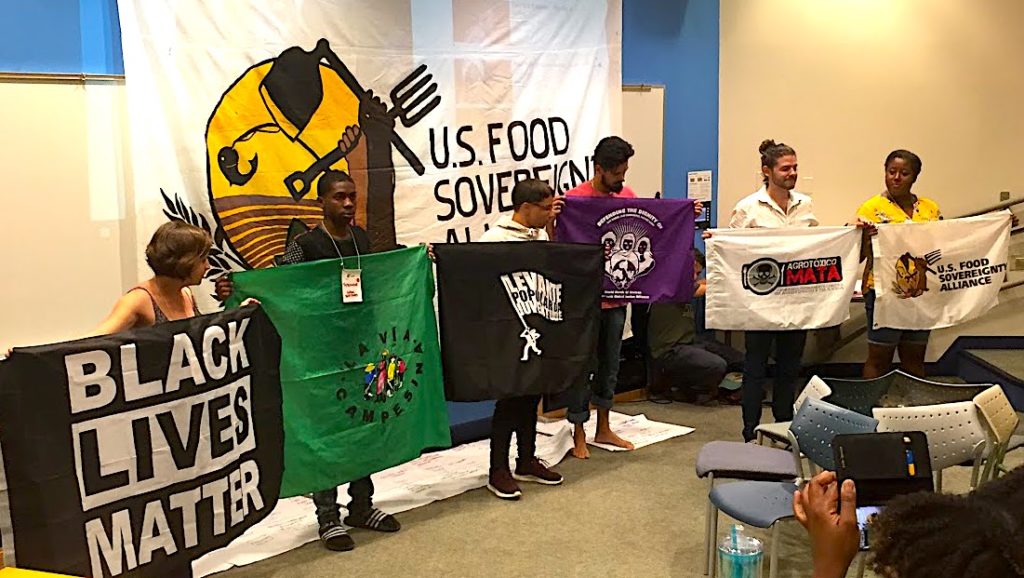Agrarian Trust Fall Newsletter
 We hope you’ve been enjoying the changing of the seasons. We’re looking forward to the crackle of leaves and harvests of autumn—and to the many upcoming events where we’ll have the opportunity to meet and share more on our work to create an agrarian commons.
We hope you’ve been enjoying the changing of the seasons. We’re looking forward to the crackle of leaves and harvests of autumn—and to the many upcoming events where we’ll have the opportunity to meet and share more on our work to create an agrarian commons.
As we travel the land, meeting with farmers and communities, we’ve been sharing our vision and documenting successful stories that inform our approach to land stewardship and equity. Our Director, Ian McSweeney, was also just interviewed for a Civil Eats article on farm transfer, ownership, and next generation tenure. Follow @AgrarianTrust on social media to see it when published. We’ve just released our first case study on the inspiring and instructive example of Temple-Wilton Community Farm, including the lovely visual diagram you see above. The story of Temple-Wilton has greatly informed our work to develop an agrarian commons. Temple-Wilton is home to the oldest continuously operating community-supported agriculture farm (CSA) in the U.S. It was established in communication with Indian Line Farm, and the two co-developed the CSA model.
Our colleagues at the Schumacher Center for a New Economics were also part of supporting the development of the CSA model in the late 1980s. During that time, “subscription farming” methods were also being developed and popularized by innovators such as Booker T. Whatley, a professor of agriculture focused on small farm viability. Like Indian Line Farm, Temple-Wilton sought not just to build a base of subscribers but to engage broader community support to sustain the farm. Now as Agrarian Trust creates the local Agrarian Commons, we join a circle of learning with these and other innovators and leaders in sustainable agriculture and conservation.
Read more: Thirty Years of Trailblazing a Farm Community at Temple-Wilton Community Farm
Our team is deeply engaged in supporting, creating, and being part of a just and equitable food system, emphasizing the importance of efforts to create and sustain community-supported farmland. Jamie Pottern, our Land, Community & Education Director, recently attended the Northeast Regional Assembly of the U.S. Food Sovereignty Alliance to develop deeper ties with food justice organizations and explore opportunities for collaboration.
Check out her blog post: Building Power: Advancing a People’s Agenda for Food Sovereignty & Climate Justice at the U.S. Food Sovereignty Alliance’s Northeast Regional Assembly
Jamie also attended the Land Trust Alliance Rally and the National Young Farmers Coalition conference this past month in Pittsburgh, and Ian and Rachel Payne attended a Wake Forest School of Divinity gathering, Seeking Health for Creation: People, Land, and Hope for the Future, in North Carolina. Watch for new blog posts on both.
Where Agrarian Trust Will Be This Fall
We have an exciting fall schedule ahead. Hope to see you at one of these great upcoming events!
• Biodynamic Association Conference, Transforming the Heart of Agriculture: November 14-18th in Portland, OR
• Tennessee Local Food Summit: November 30th – December 2nd in Nashville, TN
• Schumacher Center for a New Economics and visiting partner farms and farmers: October 26-29th in Hudson Valley, NY and Berkshires, MA
• Regenerate: October 31st – November 2nd in Albuquerque, NM
At the largest of these events, the Biodynamic Association Conference, our team will present on the work of FaithLands and the development of the Agrarian Commons. Growing out of the gathering organized by our sister organization, the Greenhorns, FaithLands has brought together faith-based organizations from around the country under a shared vision of connecting religious traditions, agriculture, and stewardship, inspiring a spiritual and ethical revolution in our relationship to each other and the land.
This visionary work is already finding support and champions within faith communities. The Episcopal Church recently passed a resolution proposed through a committee that included one of our FaithLands members for the use of church-owned land for regenerative agriculture and similar projects.
 Agrarian Commons
Agrarian Commons
Agrarian Trust is creating a local Agrarian Commons (through establishing 501c2 land-holding entities) to support land access and tenure for the next generation of farmers. We see this model as a necessary and innovative approach to address the realities of farmland owner demographics, wealth disparity, farm viability, and all who are excluded and marginalized from equity in land, food, and community.
The local Agrarian Commons will hold farmland to: (1) support ecological restorative agriculture and community, (2) convey 99-year lease tenure and equity interest to farmers, (3) share in ecological stewardship investment, and (4) support farm viability and local agrarian economies.
Services
Agrarian Trust has now developed a way to support our stakeholders through consulting services. These include free resources such as technical assistance and access to our Agrarian Legal Support initiative’s resources and network of attorneys. This also includes our fee for service work to complete lease, conservation, transfer, and stewardship agreements.
For a full list of the services we provide, visit: our technical services page
Farmers in NH and VA have recently contracted Agrarian Trust to facilitate lease negotiations and agreements to achieve secure and equitable land tenure for their farms’ needs. Through this work, we’re able to directly support stakeholders with land tenure. We know that the needs for stable land tenure are significant and that we must grow the capacity of Agrarian Trust to provide support in this way.
New Advisors & Contributors
We’re grateful for our newest advisors and contributors who’ve engaged to support our work and help Agrarian Trust grow as team, an organization, and a community. Amy Laura Cahn has joined to support our Agrarian Legal Support initiative. Rachel Payne has joined us to support our FaithLands initiative. Katie Shelly dove into creating beautiful and informative new graphics and illustrations. Ted Bellinger will focus on our financial management, planning, and strategy. Brad Miller is contributing expertise in ecological agriculture, land stewardship, and community building. Keefe Keeley brings his experience with international farm practices and experience, research, and work to advance native oak savannas of the upper Midwest.
Our Thanks
Many thanks are due to the Donner Foundation and Trisons Foundation for their recent support to expand our organizational capacity and Agrarian Commons development. We thank Namaste Foundation for their visionary support that has helped us grow from a seedling into a young organization. We also welcome donations, including gifts of land, from supporters and look forward to seeing you online and in-person this fall so we can say thanks and let you know personally how your support keeps our work going. Please consider making a contribution to support Agrarian Trust securely on our website.



